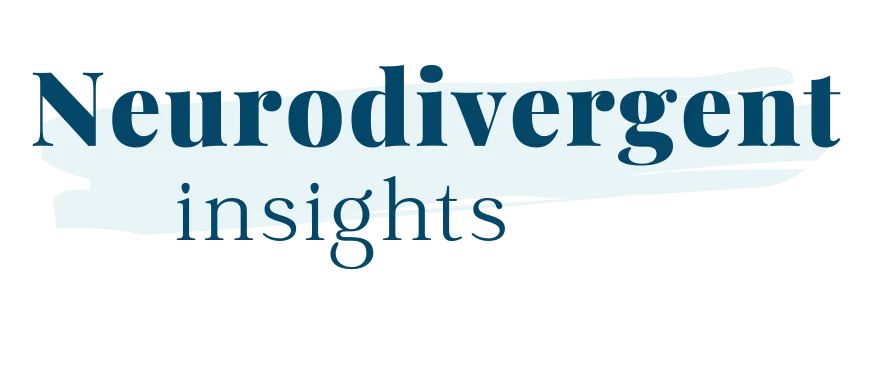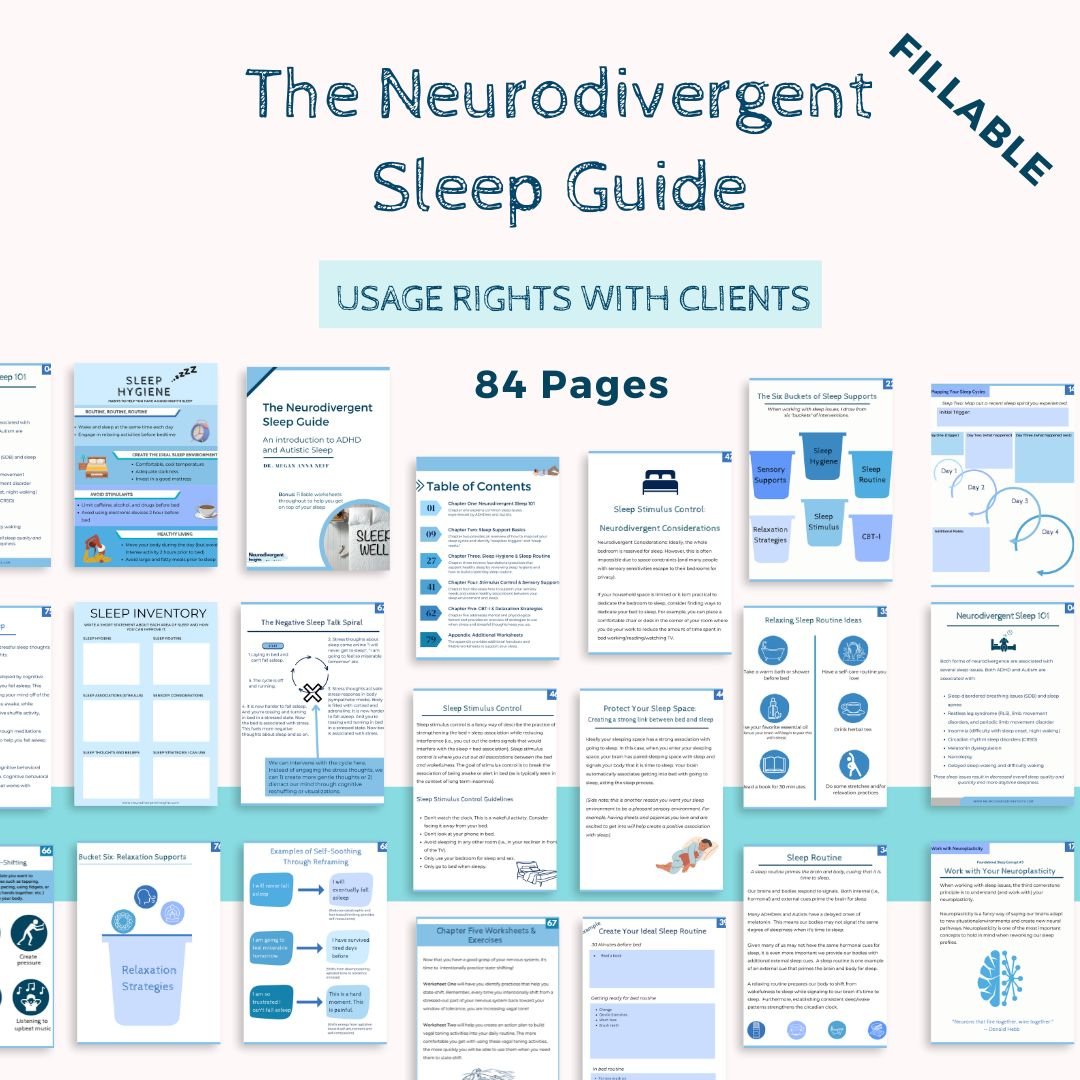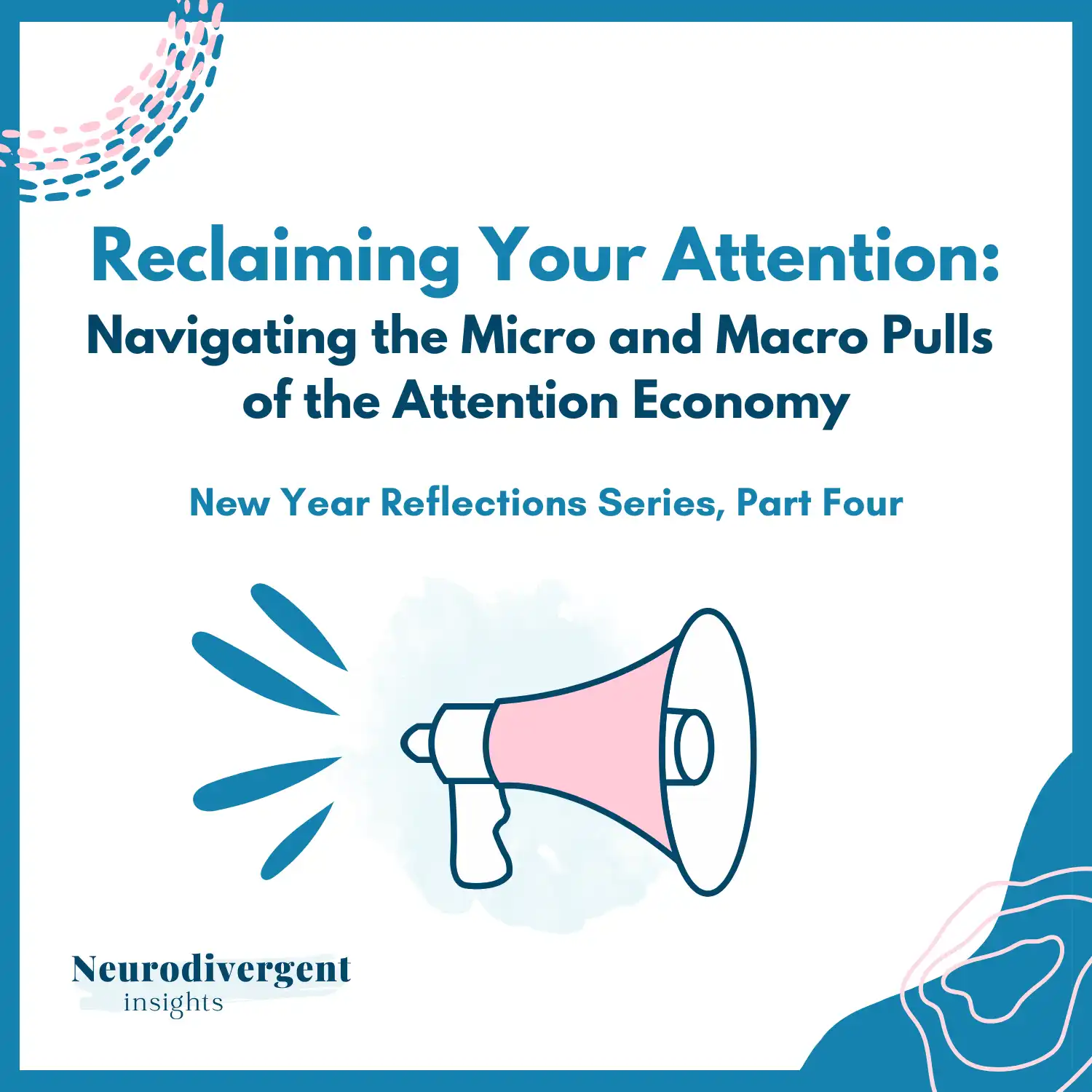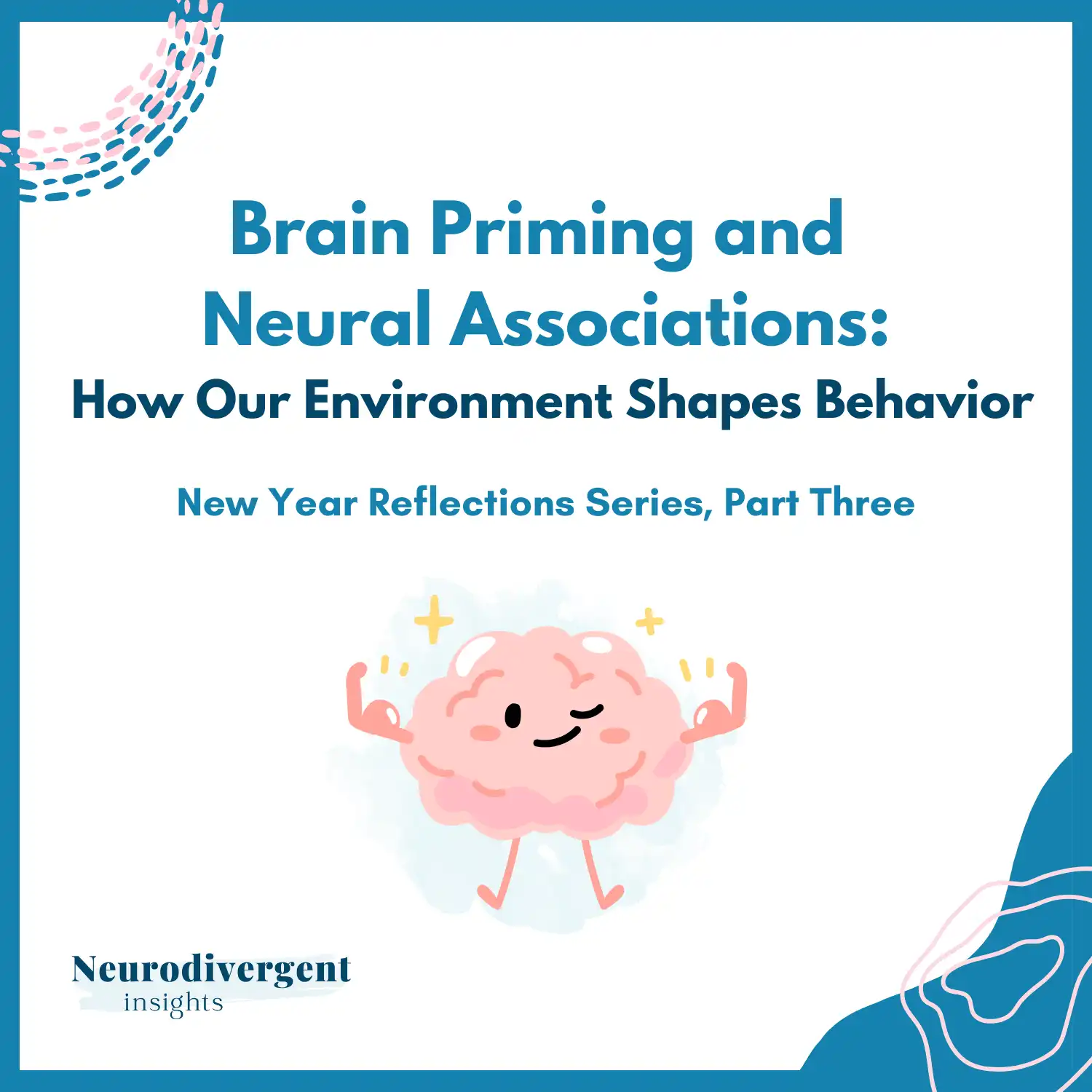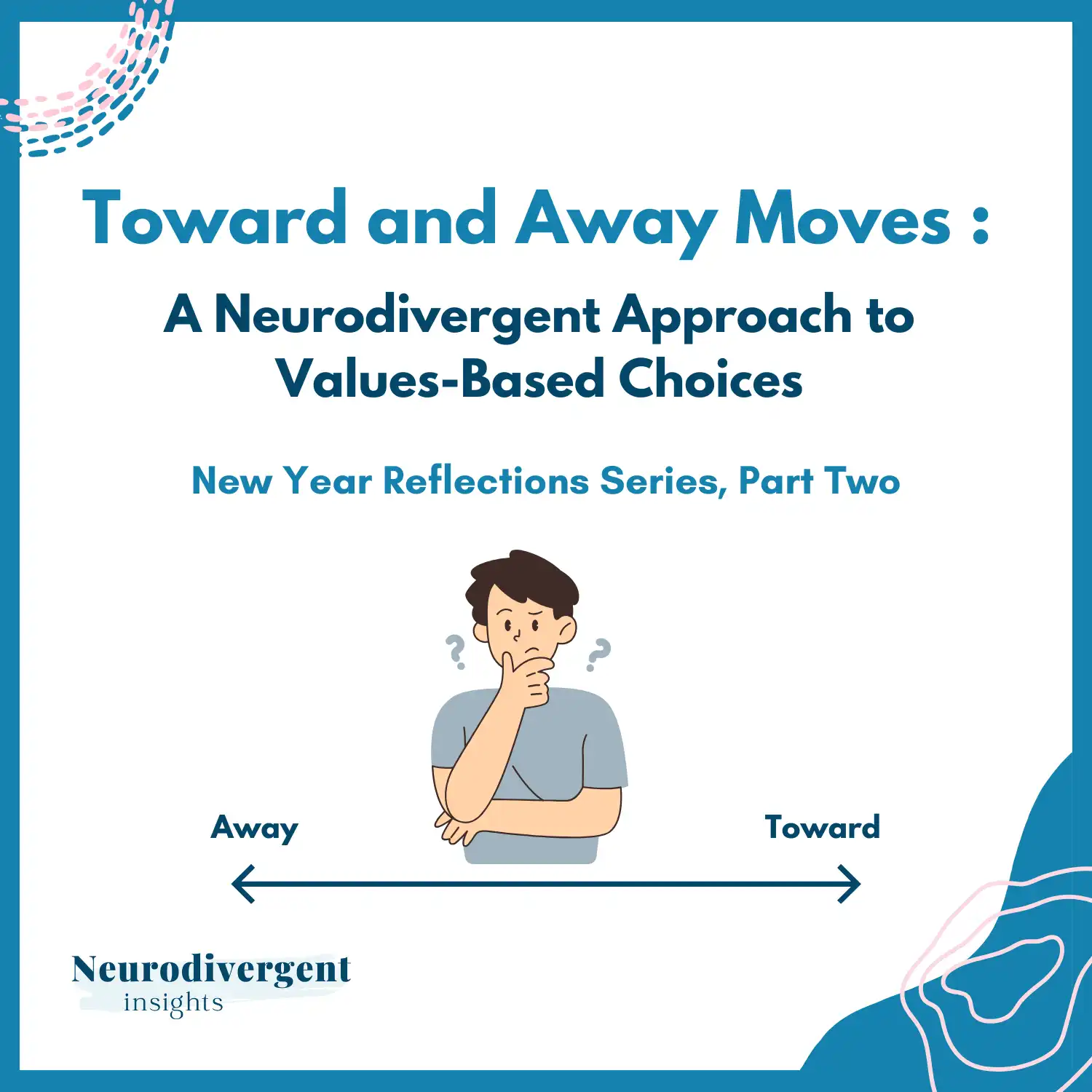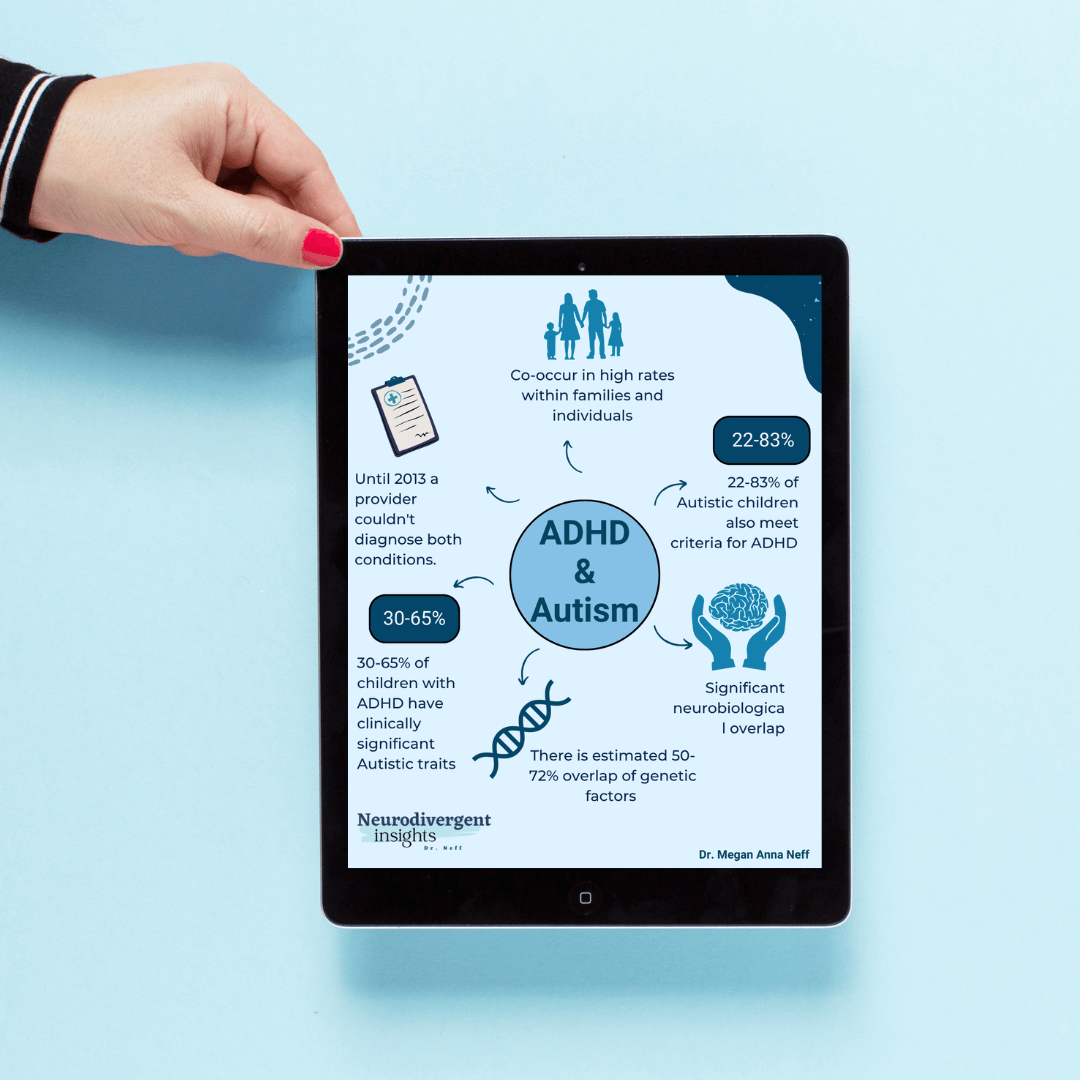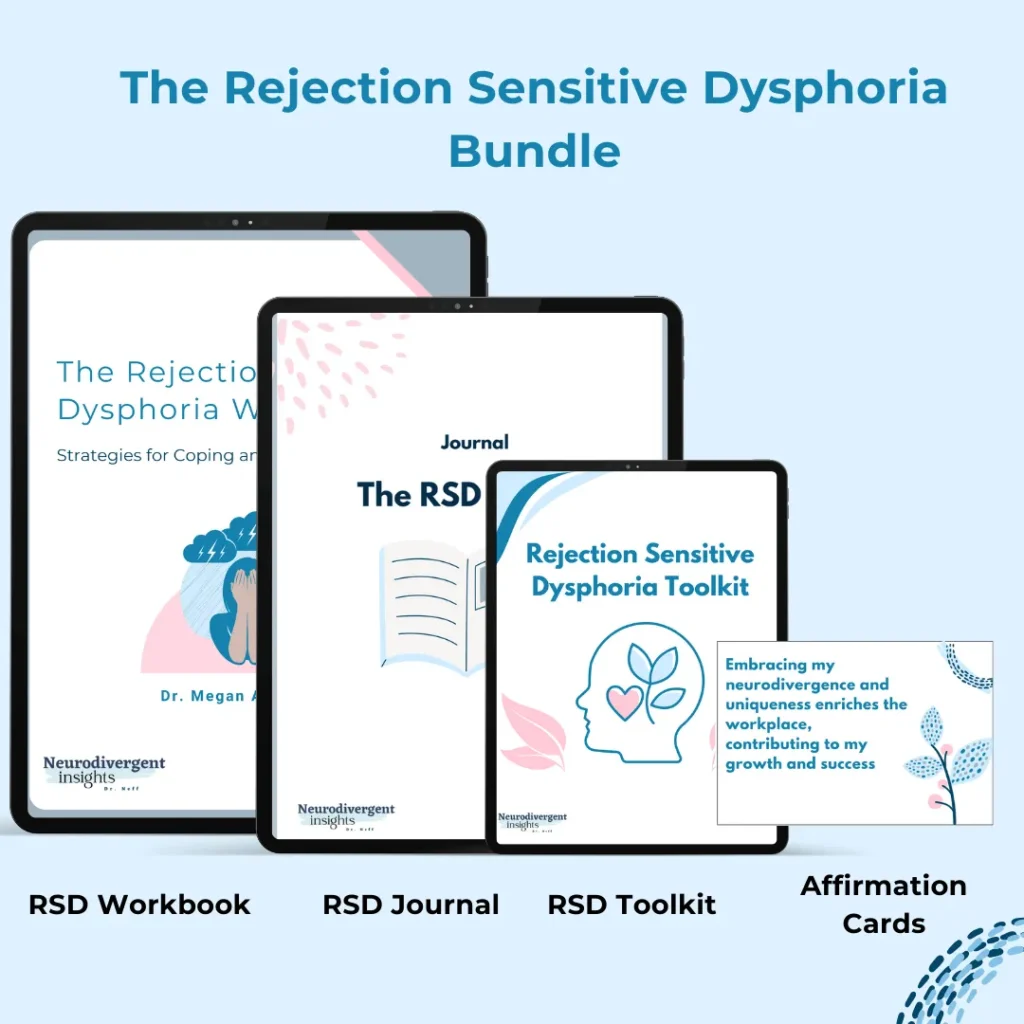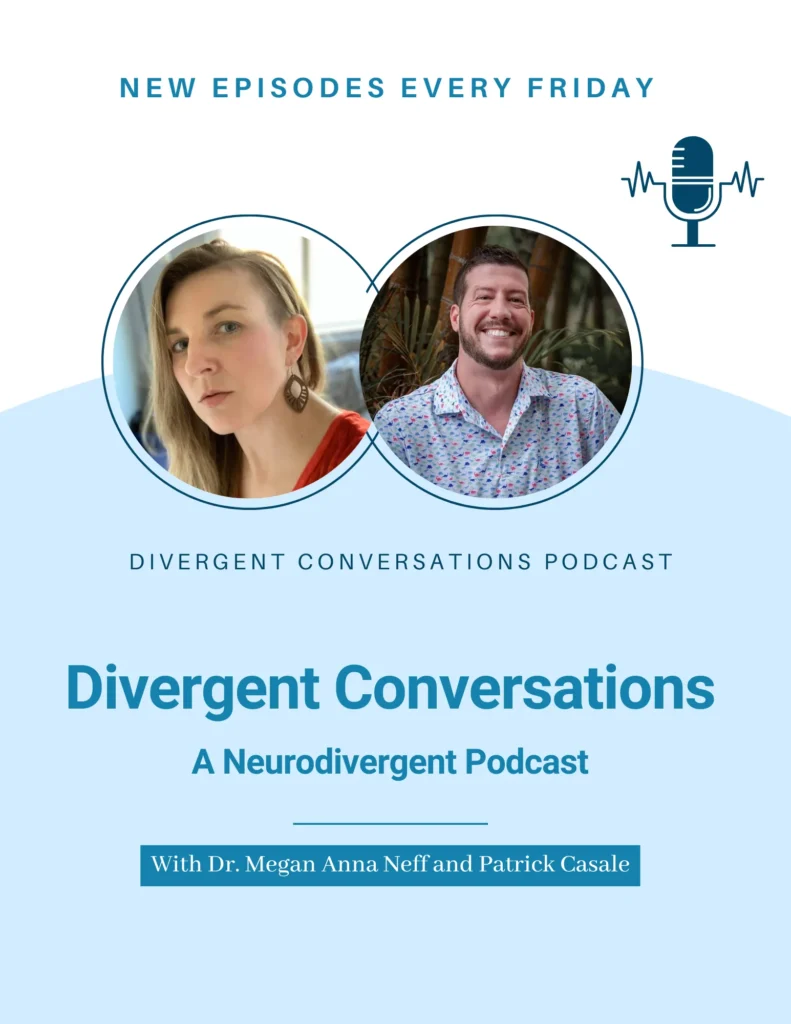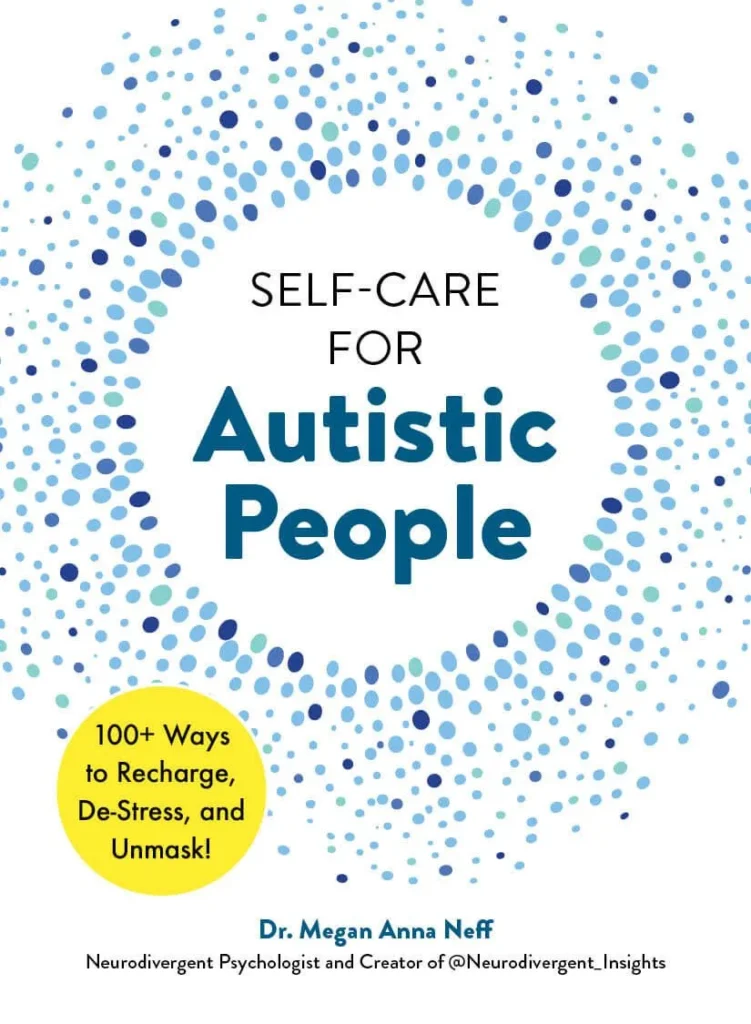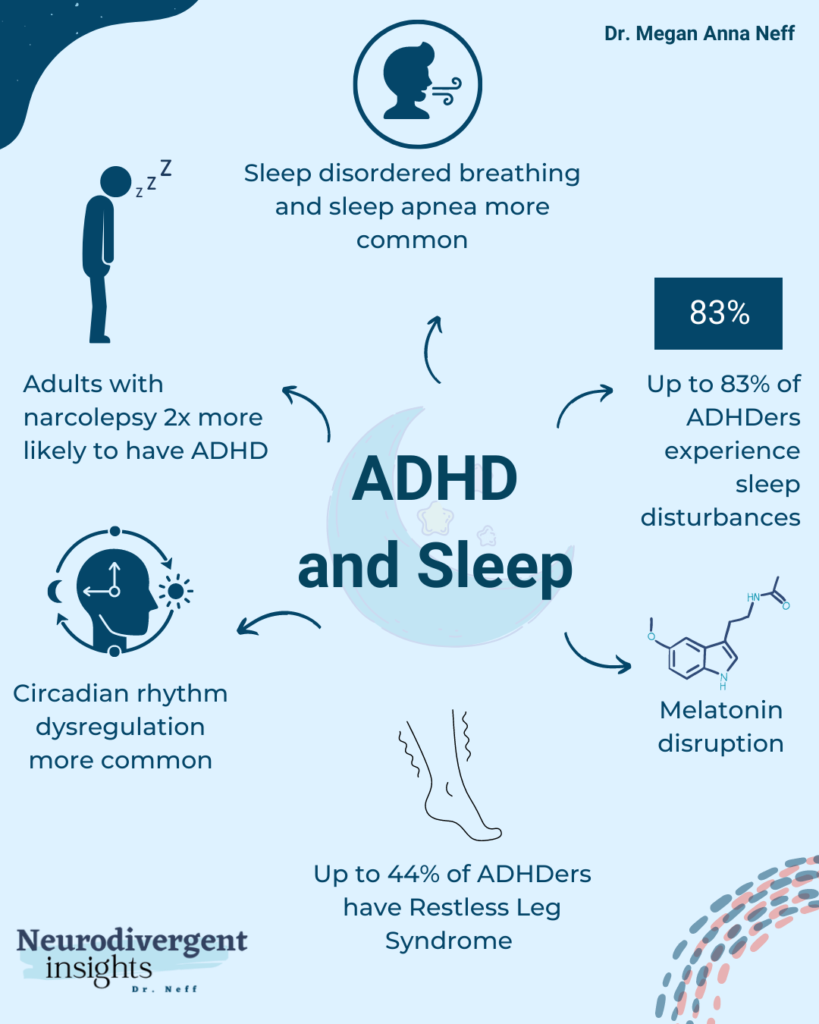
If you have ADHD, you may know firsthand how challenging it can be to get a good night’s sleep. As someone who has lived with ADHD and sleep issues, I understand how frustrating it can be. Unfortunately, sleep problems are often left untreated, despite being a common issue among ADHDers (Wajszilber et al., 2018).
Although researchers first noticed the link between ADHD and sleep disturbances in the 1950s, it was not until more recently that studies began to explore the extent of the overlap. In this infographic, we’ll explore some of the most common sleep issues that people with ADHD experience, including:
✦ Sleep breathing disorders (SBD) and sleep apnea
✦ Restless Leg Syndrome (RLS) and limb movement disorders
✦ Insomnia (difficulty with sleep onset, night waking)
✦ Circadian rhythm sleep disorders (CRSD)
✦ Melatonin dysregulation
For a more detailed exploration of how neurodivergence can affect sleep, check out my in-depth article here. It includes strategies for managing sleep issues and vulnerabilities.
Okay, and now for the infographic; here is the rundown of several studies that have looked at ADHD and sleep issues.
ADHD and Sleep Rundown:
Here is a rundown of some of the numbers and studies that have looked at ADHD and sleep:
✦ ADHD is associated with increased rates of sleep-disordered breathing (SDB), restless leg syndrome (RLS), circadian rhythm sleep disorders (CRSDs), insomnia, and narcolepsy (Wajszilber, 2018).
✦ As many as 83% of ADHDers experience sleep disturbances, including nonspecific sleep disruptions, parasomnias, hypersomnia, and limb movement disorders (Sobanski et al., 2008).
✦ 44% of ADHDers have been found to have RLS or RLS symptoms, and up to 26% of subjects with RLS were found to have ADHD or ADHD symptoms (Konofal et al., 2010).
✦ Dopaminergic abnormalities and iron deficiency are thought to underlie the co-occurrence of ADHD and RLS Konofal et al., 2010
✦ Circadian rhythm and melatonin disruptions are more common among ADHDers (Coogan et al., 2016).
✦ Adults with narcolepsy have two times the likelihood of ADHD compared with controls (Ohayon, 2013).
✦ A history of snoring or possible obstructive sleep apnea (OSA) during childhood is associated with a twofold likelihood of having ADHD (Wajszilber, 2018).
Implications of Poor Sleep
Sleep is foundational for our physical and mental health. Our brains work hard when we sleep! They are storing our new learning and memories in long-term storage; they are detoxing our brains and releasing new neurotransmitters we need to feel refreshed.
Sleep and Neurotransmitters
During sleep, our brains release certain chemicals called neurotransmitters. These chemicals help regulate our mood, help us learn, grow and regulate our sleep-wake cycle. For example, when we’re sleeping, our brains release
✦ Serotonin, which helps regulate our mood and makes us feel good.
✦ Acetylcholine, which is important for memory consolidation, learning, and attention
✦ Melatonin, which regulates the sleep-wake cycle and helps us feel sleepy
✦ Growth hormone, which helps the body grow and repair
When we don’t get enough sleep, our brains don’t get the chance to release these chemicals. And that can lead to a whole host of problems! When we’re sleep-deprived, we’re more likely to feel grumpy, anxious, and irritable. Plus, it’s harder for us to focus and learn new things.
On the other hand, lack of sleep can lead to an increase in the levels of cortisol throughout the day, which is a stress hormone that can contribute to feelings of anxiety and difficulty relaxing. It also disrupts our circadian rhythm.
On the flip side, when we have enough good-quality sleep, it helps to maintain a balance in these hormones, which can improve our mood and overall mental well-being.
The Detoxing Benefits of Sleep
During sleep, the brain not only releases new chemicals, but it also cleans up from the day. It detoxifies certain chemicals, similar to how a cleaning cycle runs during the night while you sleep. If you ever wake up feeling refreshed and ready to start the day, it’s likely because your brain was working to clear away certain chemicals and hormones while you slept. This process helps keep the brain and body functioning properly.
One of the main things it’s cleaning up is a chemical called adenosine. Adenosine is like a sleepy chemical that builds up in your brain throughout the day. But while you sleep, your brain works to clear it out, so you wake up feeling more alert and less groggy.
Another thing your brain is cleaning up while you sleep is a chemical called glutamate. Glutamate helps with learning and remembering things. But when you’re awake, your brain uses a lot of it. So, at night, your brain works to clear away any extra glutamate you don’t need so that you’re ready to learn and remember new things again in the morning.
Implications of ADHD and Sleep
Beyond the typical health risks associated with sleep deprivation, sleep deprivation causes additional struggles for ADHDers, such as increased sensory sensitivities and executive functioning struggles.
Sensory Sensitivities
Sleep and sleep deprivation can have a significant impact on sensory sensitivities. When we are well-rested, our brains are better able to process and filter sensory input, allowing us to better tolerate and manage our sensitivities. Adequate sleep also helps to regulate our emotional responses to sensory stimuli, making us less likely to feel overwhelmed or reactive.
On the other hand, when we are sleep-deprived, our brains are less able to filter and process sensory input, making us more sensitive to stimuli. This can lead to increased feelings of overwhelm and irritability in response to sensory input. Additionally, sleep deprivation can also exacerbate symptoms of anxiety and depression, which can further worsen the experience of sensory sensitivities.
Many ADHDers have heightened sensory sensitivities, so the negative impact of sleep deprivation can be even more pronounced for us. Supporting our sleep can be an important part of managing our sensory sensitivities.
Executive Functioning
When ADHD and sleep issues co-occur, this can amplify executive functioning difficulties. Executive functioning includes the ability to plan, organize, and carry out tasks. Executive function is controlled by the prefrontal cortex, an area of the brain that is particularly sensitive to lack of sleep.
When we don’t get enough sleep, the prefrontal cortex doesn’t function as well, leading to difficulties with planning, decision-making, and impulse control. This can make it even harder for ADHDers to manage our symptoms and can make daily tasks such as work or school more challenging.
ADHD Treatment Implications
Medical professionals and therapists who work with ADHDers should also consider sleep in their treatment and support strategies. A few implications of these findings may include:
A baseline sleep evaluation should be provided as a part of an initial ADHD assessment. Regular screening for sleep problems should be included as a component of ADHD treatment and management (Wajszilber et al., 2018).
Treatment should consider the self-perpetuating loop of ADHD/sleep issues: Sleep difficulties and ADHD can quickly become a self-perpetuating loop. ADHDers often struggle with unhealthy sleep practices, a lack of routine, resistance at bedtime, difficulty settling down in the evening, and poor sleep hygiene practices, which all contribute to poor sleep difficulties.
Poor sleep leads to more difficulty with inattention, focus, and maintaining healthy practices and routines to support better sleep. As such, it can quickly become a negative self-perpetuating loop. Identifying the triggers in this cycle and intervening appropriately is an essential part of ADHD treatment.
A holistic approach to supporting ADHD will also include sleep supports. As Wajszilber et al., 2018 noted, “Sleep problems combined with ADHD can result in significant…impairments that affect mood, attention, behavior, and ultimately school/work performance and quality of life.” Sleep deprivation exacerbates many ADHD vulnerabilities (mood disorders, attention struggles, and more); for this reason, a holistic approach to ADHD will incorporate sleep support.
Conclusion
There is a strong overlap between ADHD and sleep. Many ADHDers struggle with disordered breathing, sleep disturbances, restless leg syndrome, and more. Because of this, sleep screening and treatment should be a part of every ADHDer’s care plan.
If you have ADHD and struggle with getting good sleep at night, I recommend checking out my article on ADHD, Autism, and Sleep. In this guide, not only will you get more information about sleep and neurodivergence, but you will also get loads of resources and strategies to help you get better sleep at night.
You can also download the Neurodivergent Sleep Guide, with lots of workbook pages to help you better understand your sleep.
Citations
orkum P, Tannock R, Moldofsky H. Sleep disturbances in children with attention-deficit/hyperactivity disorder. J Am Acad Child Adolesc Psychiatry. 1998;37(6):637–646.
Coogan, A. N., Baird, A. L., Popa-Wagner, A., & Thome, J. (2016). Circadian rhythms and attention deficit hyperactivity disorder: The what, the when and the why. Progress in Neuro-Psychopharmacology and Biological Psychiatry, 67, 74-81. https://doi.org/10.1016/j.pnpbp.2016.01.006
Konofal, E., Lecendreux, M., & Cortese, S. (2010). Sleep and ADHD. Sleep medicine, 11(7), 652–658. https://doi.org/10.1016/j.sleep.2010.02.012
Ohayon MM. 2013. Narcolepsy is complicated by high medical and psychiatric comorbidities: a comparison with the general population. Sleep Med. 14(6):488–492. DOI: https://pubmed.ncbi.nlm.nih.gov/23643648/
Sobanski, E., Schredl, M., Kettler, N., & Alm, B. (2008). Sleep in adults with attention deficit hyperactivity disorder (ADHD) before and during treatment with methylphenidate: a controlled polysomnographic study. Sleep, 31(3), 375-381. https://academic.oup.com/sleep/article/31/3/375/2454163
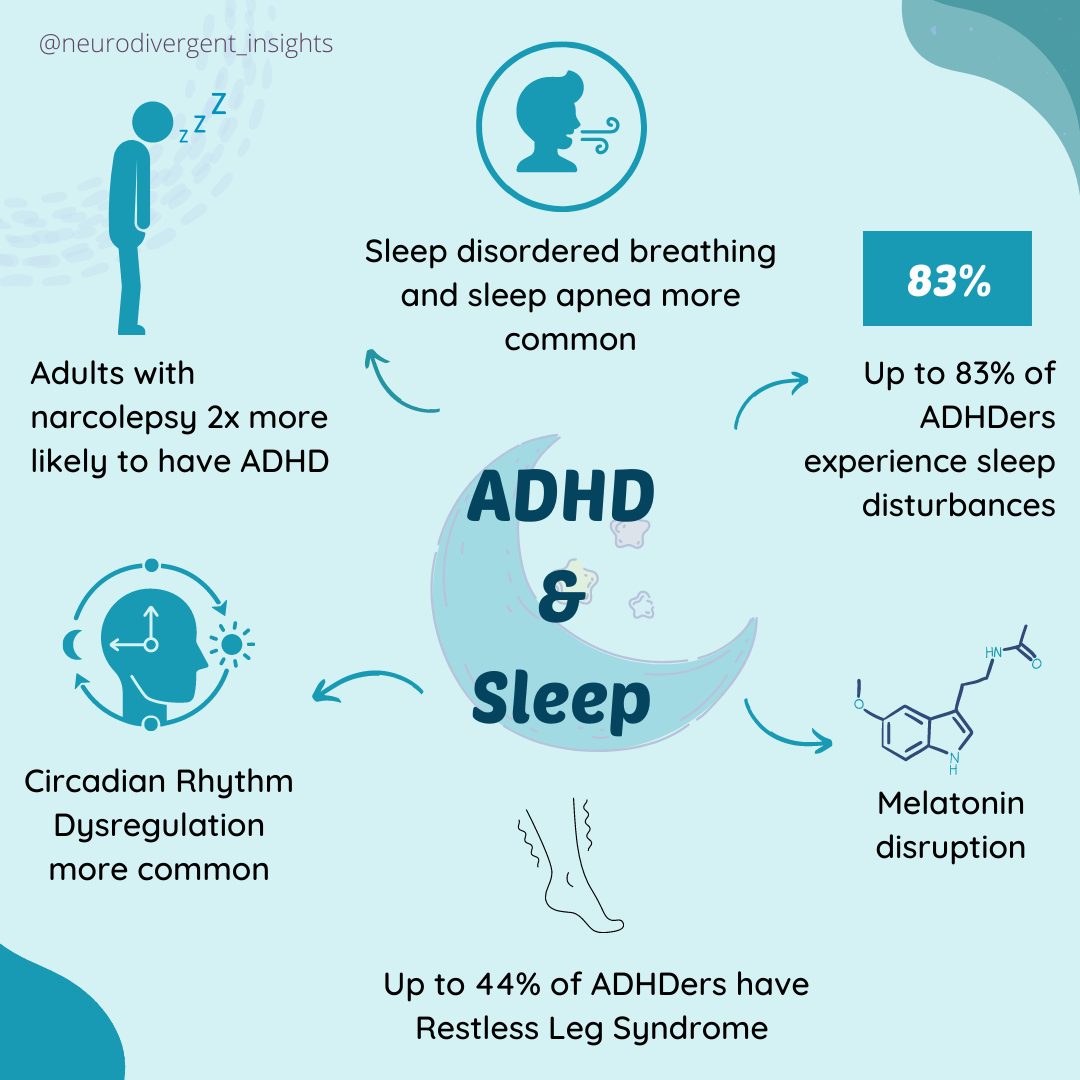
Wajszilber, D., Santiseban, J. A., & Gruber, R. (2018). Sleep disorders in patients with ADHD: impact and management challenges. Nature and science of sleep, 10, 453–480. https://doi.org/10.2147/NSS.S163074
This post was proofread by Grammarly, my go-to for proofreading and catching all the details I naturally miss! Grammarly is entirely free to use. Click here to give it a try.
